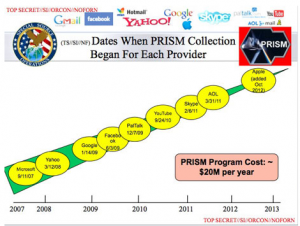 Since the disclosure of the PRISM program, I have thought about a letter the industry group for some of the biggest and earliest PRISM participants — Google, Microsoft, and Yahoo — wrote to then House Judiciary Chair John Conyers during the 2008 debate on FISA Amendments Act. (The screen capture reflects a partial list of members from 2009.)
Since the disclosure of the PRISM program, I have thought about a letter the industry group for some of the biggest and earliest PRISM participants — Google, Microsoft, and Yahoo — wrote to then House Judiciary Chair John Conyers during the 2008 debate on FISA Amendments Act. (The screen capture reflects a partial list of members from 2009.)
Remarkably, the letter strongly condemned the effort to grant companies that had broke the law under Bush’s illegal wiretap program immunity.
The Computer & Communications Industry Association (CCIA) strongly opposes S. 2248, the “FISA Amendments Act of 2007,” as passed by the Senate on February 12, 2008. CCIA believes that this bill should not provide retroactive immunity to corporations that may have participated in violations of federal law. CCIA represents an industry that is called upon for cooperation and assistance in law enforcement. To act with speed in times of crisis, our industry needs clear rules, not vague promises that the U.S. Government can be relied upon to paper over Constitutional transgressions after the fact.
CCIA dismisses with contempt the manufactured hysteria that industry will not aid the United States Government when the law is clear. As a representative of industry, I find that suggestion insulting. To imply that our industry would refuse assistance under established law is an affront to the civic integrity of businesses that have consistently cooperated unquestioningly with legal requests for information. This also conflates the separate questions of blanket retroactive immunity for violations of law, and prospective immunity, the latter of which we strongly support.
Therefore, CCIA urges you to reject S. 2248. America will be safer if the lines are bright. The perpetual promise of bestowing amnesty for any and all misdeeds committed in the name of security will condemn us to the uncertainty and dubious legalities of the past. Let that not be our future as well. [my emphasis]
Microsoft, Yahoo, and Google all joined PRISM within a year of the date of the February 29, 2008 letter (Microsoft had joined almost six months before, Google would join in January 2009).
 Clearly, the demand that the companies that broke the law not receive retroactive immunity suggests none of the members had done so. It further suggests that those companies that did break the law — the telecoms, at a minimum — had done something the email providers wanted them held accountable for. This suggests, though doesn’t prove, that before PRISM, the government may have accessed emails from these providers by taking packets from telecom switches, rather than obtaining the data from the providers themselves.
Clearly, the demand that the companies that broke the law not receive retroactive immunity suggests none of the members had done so. It further suggests that those companies that did break the law — the telecoms, at a minimum — had done something the email providers wanted them held accountable for. This suggests, though doesn’t prove, that before PRISM, the government may have accessed emails from these providers by taking packets from telecom switches, rather than obtaining the data from the providers themselves.
Google had also fought a DOJ subpoena in 2006 for a million URLs and search terms, purportedly in the name of hunting child pornographers.
And those of us who follow this subject have always speculated (with some support from sources) that the plaintiff in a 2007 FISA Court challenge to a Protect America Act (the precursor to FISA Amendments Act) was an email provider.
All of those details suggest, at the very least, that email providers (unlike telecoms, which we know were voluntarily giving over data shortly after 9/11) fought government efforts to access their data.
But it also suggests that the email providers may have treated PRISM as a less worse alternative than the government accessing their data via other means (which is a threat the government used to get banks to turn over SWIFT data, too).
It seems likely the way the government “negotiates” getting data companies to willingly turn over their data is to steal it first.